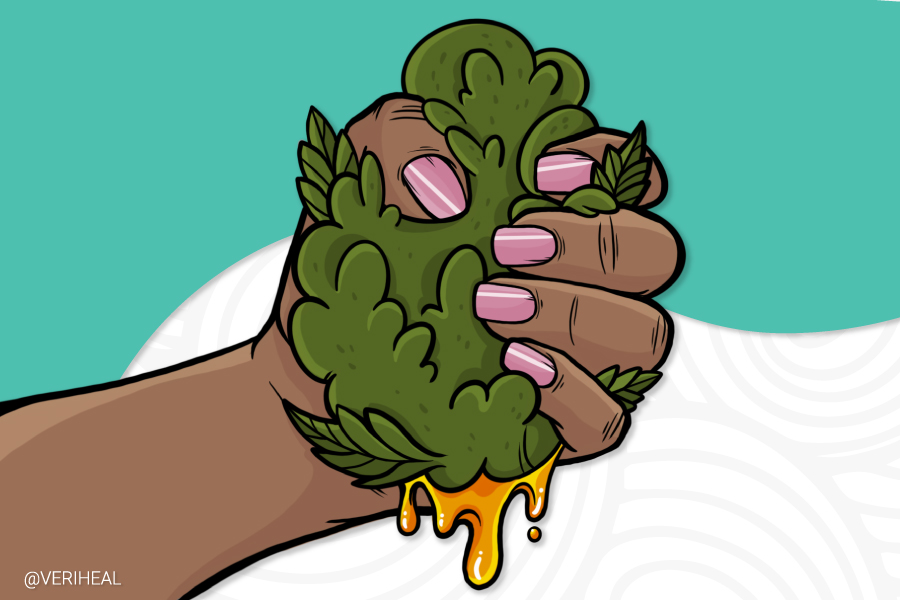Cannabis concentrates are all the buzz throughout the cannabis community. There are several different varieties of cannabis concentrates available for consumers to choose from. While there is an endless selection of strains and combinations when it comes to concentrates, only a few methods are utilized in their creation! The 5 most common methods utilized in cannabis extraction are as follows.
- Alcohol- used to make RSO (Rick Simpson Oil) or cannabis oil
- Heat and pressure- also called a rosin press used to make live rosin
- Hydrocarbon or solvent extraction- uses hexane, propane, butane, etc., to run through a closed-loop extraction system
- CO2 extraction- also called, supercritical CO2 extraction uses CO2 and a closed-loop extraction system
- Ice water extraction- uses frigid water and pressure
The most common types of cannabis concentrates are BHO (butane honey oil), CO2, and solventless extractions commonly called live rosin, which uses heat and pressure versus a solvent such as butane or CO2. One of the most common types of cannabis concentrates on the market are BHO concentrates. Butane can be used in the extraction process to make shatter, batter, crumble, taffy, wax, or one of many other terms used to describe the end consistency of the concentrate produced.
Now that we know some of the ways cannabis concentrates are made let’s take a look at some of the equipment used to make this green gold.
Blasting BHO With Metal or Glass
Blasting is the term used for running butane over cannabis to extract the cannabinoids like THC and others from the plant material. For the longest time and even still to this day, people have been blasting BHO concentrates using metal or glass tubes. Some also use plastic spice containers, which are nasty and dangerous.
Along with a glass or metal tube, one would need a razor blade, pyrex dish, cake pan, hot plate, some micron filters or coffee filters, a thermometer, and some parchment paper. After the blasting was finished and the solvent was cooked off in a water bath and transferred to parchment paper, they would go into a vacuum system. Some looked like pressure pots with an external vacuum, and others were made using mason jars and hand-held brake bleeding pumps.
Making extracts in this manner can be extremely dangerous and is against the law even in states with legal access to cannabis. To make these extractions legally, one must have a license and a certified kitchen. Instead of using metal and glass tubes, those who make extractions legally opt for closed-loop extraction systems. These systems reuse solvents such as butane, propane, or hexane, wasting little. The scientific kitchens they are produced in and licensed extractors help keep accidents like explosions from occurring like those we’ve seen in media reports.
Why You Should Get Your Medical Marijuana Card
Veriheal has satisfied millions of patients nationwide by giving them access to these benefits
- Larger purchase limits
- Peace of mind
- Enhanced legal protection
- Access to higher potency strains
- Save up to 25% on cannabis purchases
- Skip the line at the dispensary
Using Forces of Nature for Cannabis Extraction
Solvent cannabis extraction isn’t the only option out there when it comes to concentrates. Many people don’t like the idea of chemicals like butane being used to make a cannabis product. They are much more attracted to products like live rosin that use heat and pressure to extract cannabinoids instead of chemicals.
Using a heat press to extract cannabis is often referred to as squishing. A squish is performed by placing plant material in a micron sock. The sock is then placed between two metal plates with parchment or silicone mats on each side for the concentrates to ooze out on too. The plates heat up to a precise temperature and provide a perfect amount of pressure to the micron sock filled with cannabis, hence the term squish.
Every extractor has a different method for making products. The slightest change in temperatures and holding times change the end result of a product. Sometimes the exact process can be used with precision, and the result will be different.
Cannabis extraction at home can be done using the heat press method without the risk of explosion, making it the preferred choice for DIY consumers. A good rosin press can set you back a few hundred dollars or a few thousand. But they can be worth their weight in green gold if you know how to use them correctly.
Closed Loop Systems
Closed Loop extraction systems are the most commonly extraction equipment utilized in the legal cannabis market globally. These systems are capable of making cannabis extracts in large quantities, safely, with precision. However, they also come with a hefty price tag to obtain. The quality and consistency of the extractions that they produce however are off the charts according to many.
Are you a cannabis concentrate extractor? Have you worked with various equipment to produce cannabis concentrates? If so, drop us a line in the comments below and let us know about your experiences and the equipment you prefer!
Author, Share & Comments















